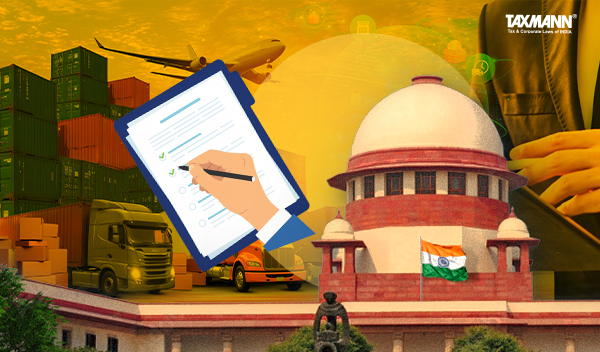Limitation Period for Filing Refund of Unutilized ITC on Export of Goods to Be Computed From Shipping Date | HC
- Blog|News|GST & Customs|
- 2 Min Read
- By Taxmann
- |
- Last Updated on 10 March, 2025

Case Details: Nitrex Chemicals India Ltd vs. Assistant Commissioner goods and Service Tax Division VIII Valsad - [2025] 171 taxmann.com 744 (Gujarat)
Judiciary and Counsel Details
- Bhargav D. Karia & D.N. Ray, JJ.
-
AR Chauhan & Punit B. Juneja for the Petitioner.
-
Utkarsh R. Sharma for the Respondent.
Facts of the Case
The assessee, an exporter, exported goods between July 2017 and March 2018 and subsequently filed a refund application under Section 54(1) of the Central Goods and Services Tax Act, 2017 (CGST Act), seeking a refund of the IGST paid on such exports. The Revenue rejected the refund claim for the period prior to June 2018, stating that it was filed beyond the prescribed two-year limitation period. Aggrieved by the rejection, the assessee filed a writ petition before the Gujarat High Court, contending that the relevant date for computing the limitation period should be the date of filing returns rather than the date of shipping. The assessee further argued that the delay was attributable to COVID-19-related disruptions and sought relief on these grounds.
High Court Held
The Hon’ble Gujarat High Court held that, as per Section 54(1) read with Explanation 2 of the CGST Act, 2017, the relevant date for computing the two-year limitation period is the date when the goods are loaded for shipping and leave India. The Court emphasized that the limitation period is mandatory and cannot be extended beyond two years, except where explicitly provided by law. As the petitioner has failed to file the refund claim within the prescribed period of two years from the relevant date, the respondent authority has rightly rejected such refund claim as being time barred.
List of Cases Reviewed
- IOC Ltd. v. UOI (SCA No. 12074/2011) – (para 19) followed, Mafatlal Industries Ltd. v. Union of India, (1997) 5 SCC 536 – (para 19) followed
- M/s. Proxima Steel Forge Pvt Ltd. v. Union of India (CWP-21975-2024) – (para 14) distinguished
- M/s. Lenovo (India) Pvt. Ltd. v. Joint Commissioner of GST (W.P. Nos. 23604 and 23605 of 2022) – (para 14) distinguished
List of Cases Referred to
- Mafatlal Industries Ltv. v. Union of India (1997) 5 SCC 536 (para 20).
Disclaimer: The content/information published on the website is only for general information of the user and shall not be construed as legal advice. While the Taxmann has exercised reasonable efforts to ensure the veracity of information/content published, Taxmann shall be under no liability in any manner whatsoever for incorrect information, if any.

Taxmann Publications has a dedicated in-house Research & Editorial Team. This team consists of a team of Chartered Accountants, Company Secretaries, and Lawyers. This team works under the guidance and supervision of editor-in-chief Mr Rakesh Bhargava.
The Research and Editorial Team is responsible for developing reliable and accurate content for the readers. The team follows the six-sigma approach to achieve the benchmark of zero error in its publications and research platforms. The team ensures that the following publication guidelines are thoroughly followed while developing the content:
- The statutory material is obtained only from the authorized and reliable sources
- All the latest developments in the judicial and legislative fields are covered
- Prepare the analytical write-ups on current, controversial, and important issues to help the readers to understand the concept and its implications
- Every content published by Taxmann is complete, accurate and lucid
- All evidence-based statements are supported with proper reference to Section, Circular No., Notification No. or citations
- The golden rules of grammar, style and consistency are thoroughly followed
- Font and size that’s easy to read and remain consistent across all imprint and digital publications are applied



 CA | CS | CMA
CA | CS | CMA
